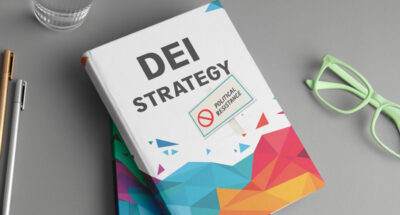
How to drive meaningful progress on DEI, without sparking political resistance
As corporate America adjusts to a shifting political environment under President Donald Trump, companies must rethink their approach to DEI. ...

by Shelley Zalis Published January 21, 2025 in Diversity, Equity, and Inclusion • 4 min read
The equation is both simple and transformative. Equality (E) is achieved when we multiply the Fairness of Opportunity (F) by the Quality of Representation (Q) and square their combined impact.
To realize this equation, workplaces must ensure that everyone, regardless of gender, race, or background, has equal access to opportunities and is equally represented at every level. In science, Einstein proved that energy and mass are interconnected. In business, the Theory of Equality demonstrates that fairness and representation are inseparable forces that, when aligned, amplify progress exponentially.
For too long, the workplace equation has been out of balance. Systemic barriers have limited access to leadership roles, fair pay, and decision-making power for women and underrepresented groups. Women, for instance, hold fewer than 12% of CEO positions at Fortune 500 companies, while less than 1% of corporate procurement dollars go to women-owned businesses. These gaps aren’t just moral failures, they represent enormous missed opportunities for growth, innovation, and progress.
When diverse voices are present and equally represented in leadership and decision-making roles, they create ripple effects throughout the organization.
Representation is a multiplier. It doesn’t just add value – it amplifies it. When diverse voices are present and equally represented in leadership and decision-making roles, they create ripple effects throughout the organization. This exponential impact is why the equation squares representation. Research from McKinsey & Company shows that companies with greater diversity in leadership are 25% more likely to achieve above-average profitability. Similarly, a study by Boston Consulting Group found that inclusive companies are 1.7 times more likely to be innovation leaders. Diverse perspectives not only strengthen decision-making but also help organizations anticipate market shifts, meet customer needs, and create groundbreaking solutions.

“As businesses navigate increasingly diverse customer bases, having leadership that reflects this diversity provides a critical competitive edge.”
When equality is prioritized, businesses thrive. Equality ensures the best talent rises to the top, driving stronger decision-making and better financial performance.
Companies like Sodexo and Johnson & Johnson, highlighted in McKinsey’s Diversity Wins report, demonstrate the tangible benefits of diverse leadership. Sodexo teams with gender-balanced management achieved a 23% increase in profitability, while Johnson & Johnson’s diverse leadership pipeline fuels innovation and strong market positioning. These examples reflect the broader truth: representation creates ripple effects, fostering mentorship, equitable growth, and better decision-making across all levels of an organization.
As businesses navigate increasingly diverse customer bases, having leadership that reflects this diversity provides a critical competitive edge. Representation isn’t just a moral imperative – it’s a business strategy. Diverse leadership equips companies to anticipate market shifts, better understand consumer preferences, and create groundbreaking solutions that drive success.

These benefits extend beyond innovation. Businesses that prioritize equality experience stronger employee retention and productivity. Inclusive workplaces see 50% lower turnover rates, according to Deloitte, saving millions in recruitment and training costs while creating a more engaged workforce.
Equality also drives consumer loyalty. As modern consumers increasingly align their spending with their values, businesses that prioritize fairness and representation are better positioned to capture market share and build long-term trust.
While other challenges like climate change and poverty require broad, systemic solutions, equality is within the control of every leader who commits to change.
The urgency for equality has never been greater. The World Economic Forum estimates it will take 134 years to close the gender gap. This timeframe is unacceptable.
However, a new global study from Morning Consult, in partnership with The Female Quotient, found a majority of global employees (58%) believe business leaders can solve gender equality in their workplaces in under a decade. Remarkably, equality is the only global goal that business leaders can solve within the lifetime of their leadership.
While other challenges like climate change and poverty require broad, systemic solutions, equality is within the control of every leader who commits to change. Morning Consult also found that 32% of the global workforce believe it is the responsibility of business leaders to solve gender equality, whereas they believe it is the responsibility of the government to solve climate change (43%) and poverty (64%), with only 5-6% believing business leaders can solve these issues.
Just as Einstein’s Theory of Relativity unlocked groundbreaking advancements in science and technology, the Theory of Equality, E = FQ², has the potential to redefine the rules of business. Fairness of opportunity ensures equitable access to resources, mentorship, and leadership pathways, while the quality of representation amplifies this fairness by ensuring diverse voices are present and valued. Together, they create exponential, lasting change.
Equality is not just the right thing to do; it’s the smartest decision a business can make. With the Theory of Equality, businesses can unleash the full potential of their talent, innovation, and impact. Let’s solve this equation. The future of business depends on it.

Founder and CEO of The Female Quotient
Shelley Zalis – CEO, Founder, and “Chief Troublemaker” of The Female Quotient – is an entrepreneur, three-time movement maker, and advocate for reshaping the workplace for the modern era. She is redefining leadership and challenging outdated systems.
At The FQ, Zalis built the largest global community of women in business across 30 industries in more than 100 countries. Previously, she transformed market research by founded OTX, later selling it to Ipsos. She co-created #SeeHer, championing accurate portrayals of women and girls in media.
A LinkedIn Top Voice and contributor to TIME and Forbes, Zalis’ accolades include the Global Leaders 50 List and Fast Company’s Brands That Matter.

April 9, 2025 • by Luca Condosta in Diversity, Equity, and Inclusion
As corporate America adjusts to a shifting political environment under President Donald Trump, companies must rethink their approach to DEI. ...

March 27, 2025 • by Jennifer Jordan, Alexander Fleischmann in Diversity, Equity, and Inclusion
Take our quiz to see if you're well-placed to implement new European rules on boardroom equality....
 Audio available
Audio available
March 18, 2025 • by Diana Markaki-Bartholdi in Diversity, Equity, and Inclusion
New EU legislation requires stronger female representation on corporate boards. Here are ways to navigate the transition....
 Audio available
Audio available
March 13, 2025 • by Öykü Işık in Diversity, Equity, and Inclusion
Widespread bias and lack of inclusivity across the tech world deters women from pursuing careers in the sector. This is a significant business risk. Here are some practical actions every reader can...
Explore first person business intelligence from top minds curated for a global executive audience